Books by Martin Koci
Rowman & Littlefield, 2020
Continental philosophers of religion have been engaging with theological issues, concepts and que... more Continental philosophers of religion have been engaging with theological issues, concepts and questions for several decades, blurring the borders between the domains of philosophy and theology. Yet when Emmanuel Falque proclaims that both theologians and philosophers need not be afraid of crossing the Rubicon – the point of no return – between these often artificially separated disciplines, he scandalised both camps.
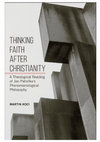
SUNY Press, 2020
This book examines the work of Czech philosopher Jan Patočka from the largely neglected perspecti... more This book examines the work of Czech philosopher Jan Patočka from the largely neglected perspective of religion. Patočka is known primarily for his work in phenomenology and ancient Greek philosophy, and also as a civil rights activist and critic of modernity. In this book, Martin Koci shows Patočka also maintained a persistent and increasing interest in Christianity. Thinking Faith after Christianity examines the theological motifs in Patočka’s work and brings his thought into discussion with recent developments in phenomenology, making a case for Patočka as a forerunner to what has become known as the theological turn in continental philosophy. Koci systematically examines his thoughts on the relationship between theology and philosophy, and his perennial struggle with the idea of crisis. For Patočka, modernity, metaphysics, and Christianity were all in different kinds of crises, and Koci demonstrates how his work responded to those crises creatively, providing new insights on theology understood as the task of thinking and living transcendence in a problematic world. It perceives the un-thought element of Christianity—what Patočka identified as its greatest resource and potential—not as a weakness, but as a credible way to ponder Christian faith and the Christian mode of existence after the proclaimed death of God and the end of metaphysics.
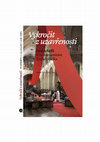
Praha: Nakladatelství Lidové noviny, 2018
This book is a gift of the academic community to the 70th anniversary of Tomáš Halík. As one of t... more This book is a gift of the academic community to the 70th anniversary of Tomáš Halík. As one of the most prolific Christian writers of our times, Halík inspires and provokes to think about the position of religion in a postmodern context. This Festschrift is aiming to offer miscellaneous perspectives on ideas which might be associated with the Czech theologian, philosopher of religion and sociologist. However, rather than analyzing Halík’s work and thought, the present collection of essays continues a dialogue on questions, opened by Halík. The international body of authors, who contributed to this book, provides the readers (including Tomáš Halík) with a critical engagement with timely ideas such as the essence of theological thinking, new perspectives on the pastoral care of the Church, and intertwining of philosophy and faith.
Three distinguished persons, His Holiness the 14th Dalai Lama, the Prague auxiliary bishop and former dissident Václav Malý, and the Polish Dominican Tomasz Dostatni opens the book with the words of wishes addressed to Tomáš Halík. The rest of the book is composed of academic texts.
Alister McGrath analyses Halík’s contribution to the practice of theology in an age of uncertainty. Mcgrath finds the most promising issue in Halík’s method of overcoming lethargy (both spiritual and intellectual). On a similar note, but in a different context, Charles Taylor argues that the only way how to defeat fundamentalism of any kind is the realisation of a dynamic spiritual renewal.
The younger generation of Czech theologians, represented by Denisa Červenková and František Štěch from the Catholic Theological Faculty of Charles University in Prague, engages with the question concerning the essence of theology. Červenková focuses on spirituality as the internal necessity for practising theology, whereas Štěch presents theology as publicly relevant discourse, and thus focuses on its external impact. Both texts highly resonate in the Czech academic debate where the debate on the nature of theology has not yet been sufficiently saturated.
Grace Davie from Exeter and Lieven Boeve from Leuven open a broader perspective. Davie presents the contextual perspective on the position of Christianity in a secular Europe. Boeve, presupposing this contextual perspective, show the paradigm shift of theology which is both unavoidable and necessary for theology to remain contextually relevant but also theologically plausible. The Cambridge theologian Janet M. Soskice then provides us with an example how such an open theology, an approach practised by Tomáš Halík, might look like. Similarly, William Barbieri from the Catholic University of America presents an argument how contextual and historical changes, called ‘signs of the time’ in the tradition of the Second Vatican Council, interacts with the Christian faith and its doctrinal development.
Besides being a scholar, intellectual and academic, Tomáš Halík is also a priest. This fact is reflected in texts which focused on pastoral issues of the contemporary Catholic Church. Paul M. Zuhlener narrates the story of the ‘Pro Pope Francis’ initiative, which he developed in cooperation with Halík. Martin Staněk, a close collaborator of Halík from the Academic Parish of Prague, deals with a difficult matter of pastoral care of divorced and remarried catechumens.
Tereza Matějčková, Pavel Hošek, and Martin Kočí return back to more theoretical questions, in one way or another associated with Halík’s own work. Matějčková treats the question of modern nihilism. Hošek, in dialogue with C. S. Lewis, meditates on the question of evil. Finally, Kočí critically engages with the future of religion in an age of media.
One of the principal domains of Halík’s interest is the interreligious dialogue. The rabbi Karol E. Sidon contributed to this book with an authentic Jewish interpretation of Torah. This remarkable text shows that the world of Judaism is truly complicated and very different from a popular imaginary and perception.
Benedikt T. Mohleník makes a similar argument, although in a completely different context. On the example of the creation of the Dominican order and its historiographic rendering, Mohelník shows that the medieval mentality is much more modern than the popular comprehension of the Middle Ages.
Last two texts leave the space of academic pulpit to come back to the church where Halík acts as a priest. Norbert Schmidt deals with the question of liturgical space. On the examples from the first half of 20th century, Schmidt argues that the space of liturgical celebration and its architectonical rendering is the expression of intellectual engagement with the thought of the time. Ivana Noble concludes this book with a meditation on the identity of pastors and spiritual leaders in our liquid times.
Journal Articles by Martin Koci
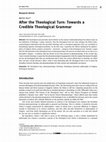
Open Theology, 2022
The theological turn provokes much debate on the nature of phenomenology but almost none on the d... more The theological turn provokes much debate on the nature of phenomenology but almost none on the definition of theology. I argue, however, that the theological turn not only enlarges the field of phenomenological exploration but also provides theology with a conceptual apparatus that can contribute to formulating rigorous theological positions. In the first step, I question the debate dominated by philosophers of religion which created a normativerestrictivecategory of the theological turn. Instead, I argue that the full potential of the theological turn in phenomenology will only be revealed when we accept it as a descriptive categorya tendency that has always in fact been present in phenomenology. In the second step, I move towards theology to argue that the phenomenological engagements with the original theological thoughts are less de-theologized than they are transformed and in their new version offered back to theology, for which they can have crucial relevance. Hence, what is truly interesting after the theological turn is not so much the boundary between theology and phenomenology but their mutual and undeniable encounters.
Transversalités, 2021
Comment comprendre la relation entre la philosophie et la théologie ? La philosophie est-elle sim... more Comment comprendre la relation entre la philosophie et la théologie ? La philosophie est-elle simplement la servante de la théologie ou est-elle plutôt une théologie exempte de superstition et d'idées irrationnelles telles que la révélation ?

Revista Portuguesa de Filosofia, 2020
This paper is a critical account on Emmanuel Falque's project of the revision of the disciplinary... more This paper is a critical account on Emmanuel Falque's project of the revision of the disciplinary boundaries between phenomenology and theology. Falque advices philosophers to embrace theology in order to philosophize better; and requests theologians to allow liberate themselves by philosophy. This proposal caused the earthquake in the field of the theological turn and earned heavy criticism. Firstly, I will contextualise and will present the background of Falque's thought. Secondly, I will engage with major objections to his project and I will argue that critics often misread it. The centre of gravity is the definition of theology. Despite using the same sources, namely Heidegger's radical distinction between the ontic science of theology and the ontological science of philosophy, Falque and his critics come to mutually exclusive conclusions. I will argue that critics employ a reductive definition of theology which results in the rejection of Falque's general revision of the boundaries between disciplines. However, as it will be argued, Falque contributes not only to a philosophically plausible enrichment of phenomenological thought but also to a credible revision of theological practice in a phenomenological fashion.

Journal for Continental Philosophy of Religion, 2020
We have no other experience of God but the human experience, claims Emmanuel Falque. We – human b... more We have no other experience of God but the human experience, claims Emmanuel Falque. We – human beings – are in the world. Whatever we do, whatever we think and whatever we experience happens in the world and is mediated by the manner of the world. This also includes religious experience. Reflection on the possibility of religious experience – the experience of God – suggests that the world is interrupted by someone or something that is not of the world. The Christian worldview makes the tension explicit, which is perhaps why theology neglects the concept and fails in any proper sense to address the world. Through following the phenomenologist Jan Patočka, critiquing the theologian Johann B. Metz and exploring the theological turn in phenomenology, I will face the challenge and argue for a genuine engagement with the world as a theological problem.
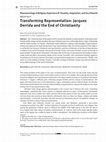
Open Theology, 2019
The central question of this paper revolves around the problem of representation. Following Jacqu... more The central question of this paper revolves around the problem of representation. Following Jacques Derrida and his critique of representation, this paper will interconnect two, at first sight distinct, topics: Christianity and the world of media. For Derrida, Christianity stands behind our common understanding of representation, whereas the media are the major driving force of any representation today. The central argument of this paper is to unfold this link between Christianity and representation and thus to elaborate on the idea of representation in relation to the end of Christianity announced by Derrida. Firstly, I will review Derrida's account on the logic of representation. Derrida deems Christianity to be responsible for the logic of representation discernible in today's media world and offers a devastating critique of the concept. Secondly, I will contextualize Derrida's approach by pointing out the tension between the modern and postmodern perspectives on representation. Thirdly, I will return to a close reading of Derrida. Fourthly, I will offer a critique of Derrida's critique and will look further at the possible meanings of 'the end of Christianity.'

The Heythrop Journal, 2019
[OPEN ACCESS] Jan Patočka committed several philosophical heresies in his phenomenological writin... more [OPEN ACCESS] Jan Patočka committed several philosophical heresies in his phenomenological writings. Perhaps the most fascinating consists of his lifelong preoccupation and rapprochement with Christianity. This paper presents and further develops Patočka’s rethinking of Christianity after the end of Christendom. First, I will analyze a Post-Christendom situation. Second, I will reconstruct the core of Jan Patočka’s heretical Christianity which he finds in the concept of caring for the soul. Finally, I will draw inspiration from Patočka’s thought in order to think beyond his concept. Rethinking Patočka’s rethinking of Christianity will lead to the proposal of Christianity after the end of Christendom that is both a philosophically plausible and existentially relevant mode of being as well as a theologically inspiring idea for reshaping the Christian religion in a problematic postmodern pluralistic world.
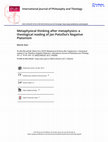
International Journal of Philosophy and Theology, 2018
WINNER OF THE IJPT ESSAY PRIZE
For decades now, the end of metaphysics has been heralded. Engagi... more WINNER OF THE IJPT ESSAY PRIZE
For decades now, the end of metaphysics has been heralded. Engaging with the issue at stake, first, I will present and critically discuss Jan Patočka’s prophetic reflection on the fate of metaphysics after (the end of) metaphysical philosophy. This will show that the problem is far more complicated and that attempts devoted to overcoming metaphysics often unjustly reduce it. To be able properly address the complexities of the crisis of metaphysics, I will move beyond Patočka and will introduce the agent, which played a decisive role in the history of metaphysics and its devel- opment, that is, theology. I will point out that Patočka’s reconsideration of metaphysical thinking via the reinterpretation of the Platonic Idea correlates with the category of faith. Thus, I will argue that ‘a providential marriage’ between Athens and Jerusalem should not be divorced and that, despite numerous attempts to prove the contrary, the alliance of theology metaphysical thinking is unavoidable and even beneficial for both parts.

Modern Theology, 2017
This article focuses on the idea of sacrifice in the work of the Czech phenomenologist Jan Patočk... more This article focuses on the idea of sacrifice in the work of the Czech phenomenologist Jan Patočka. It presents and examines this philosopher from a theological perspective against the background of the theological turn in contemporary philosophy. First, the article focuses on Patočka's reflections on the kenotic sacrifice, which he defines as the sacrifice for nothing. Second, Patočka's thought is put into dialog with Jean-Luc Marion's phenomenological sketch of sacrifice embedded in his phenomenology of the gift. Although both Patočka and Marion share an interest in sacrifice, a phenomenon of high theological importance, only the latter enjoys reception on the part of theology. Yet, the article argues, on the basis of further inquiry into Patočka's writings, Patočka presents a complementary and alternative perspective that not only precedes the theological turn but also challenges and opens new ways for theology. The conclusion thus portrays a kenotic form of Christianity after the end of Christianity, drawn from Patočka, as a specific spiritual being-in-the-world.
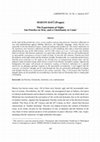
Labyrinth: An International Journal for Philosophy, Value Theory and Sociocultural Hermeneutics, 2017
In the wake of the present-day crises, social conflicts and growing divisions, Patočka's reflecti... more In the wake of the present-day crises, social conflicts and growing divisions, Patočka's reflections on war and totalitarianism appear abiding. Moreover, the enigmatic language, which Patočka uses, especially in his late Heretical Essays, sounds provoking and paradoxical. This article elaborates on the hypothesis that Patočka's reflections provide us with something more than a historical analysis interpreting the wars of the 20th century, and the 20th century as a war. I will argue that Patočka finds an intrinsic link between modernity, as a particular mode of being, and war and totalitarianism as unavoidable consequences of such a mode of being. To describe this situation, Patočka puts forth the dialectic of the light of day and the darkness of night. Paradoxically, in a somewhat mystical turn, Patočka gives preference to the night as the driving force of transgressing modern logic and the defective mode of modern being which throws crowds to the hell-fire of modern warfare. Against this background, this paper will present an innovative reading of Patočka's reflections as a specific search for an adequate spiritual response to the discontents of modernity. I will suggest that the trajectory of Patočka's thought can be read through the lens of a particular philosophy of religion, even though Patočka never elaborated on this avenue explicitly. Thus, I will propose that Patočka's thought opens up the possibility of reconsidering a heretical idea of Christianity that is coming after Christianity.
Acta Universitatis Carolinae Theologica, 2017
This article explores reasons for theologising in dialogue with contemporary postmodern philosoph... more This article explores reasons for theologising in dialogue with contemporary postmodern philosophy. Elaborating on a particular instance of a theological engagement with Jean-Francois Lyotard, I argue that theology is capable of creatively reflecting on the very question of its own mission. What can we learn from Lyotard and his thought? And more generally, why should (fundamental) theology take contemporary postmodern philosophy seriously and what are the consequences of such an engagement? The offered answers will suggest the concept of thinking as the path of authentic and plausible theology in a postmodern context.

Acta Universitatis Carolinae Theologica, 2014
There are questions that are so important that it is a pity to spoil them with answers. No doubt,... more There are questions that are so important that it is a pity to spoil them with answers. No doubt, the question of God is one of them. Contrary to many presuppositions, theology is not capable of providing us with the final answers in this respect. On the contrary, theology professed as fides quaerens intellectum is an ongoing struggle with questions. Modernity interrupted this paradigm of theolog- ical questioning. Theology was withdrawn from the realm of understanding and shifted to the realm of explanation. Modernity brought the univocalization of God. Nonetheless, the attempts to tackle the question of God lead to hegemonic narra- tives about God. Such narratives are rightly criticized in a postmodern context for their totalizing pretensions. The problem of postmodern criticism is its one-sided emphasis on the apophatic dimension of theological discourse. I propose that the- ology can go a step further beyond postmodernity. In order to do so, I deal with the Czech philosopher Jan Patočka, who provides an opportunity to rethink God from the perspective of questioning in a new way. Patočka’s insistence on problematicity is the main reading key of his work. In this line of though, I interpret Patočka’s stu- dent Tomáš Halík and his thesis about the necessity to take the metaphor of an unknown God into account. I argue that theology must avoid the temptation to remove God from the question and make a well-known God of him. The time has come for theologians to turn their answers back into questions and dwell with them.

Communio Viatorum, 2011
This article explores Yves Congar’s contribution to Vatican II and his influence on Pastoral Cons... more This article explores Yves Congar’s contribution to Vatican II and his influence on Pastoral Constitution Gaudium et Spes, especially. Author provides an analysis of Congar’s own diaries from the time of the Council as well as other relevant historical sources. The paper is divided into three sections. First section points out short introduction to the main Congar’s pre-Conciliar theological works. Second section refers to general historical information about forma-tion of Gaudium et Spes. Nevertheless, the main goal of this section is to present Congar’s original contribution to Gaudium et Spes regarding his diaries where he summarises the development of the Pastoral Constitution day by day. The analysis of Congar’s diaries discloses difficulties in the course of discussion about the relationship between the Church and the modern world. Third section explores Congar’s theological interpretations of Gaudium et Spes after the Council. The goal of this paper is not only to offer historical information about the origin and development of one of the most important Council documents. Apart from that, the author wants to open the discussion about hermeneutics of Vatican II regarding personal diaries as relevant historical sources for interpreting the Council.
Book Chapters by Martin Koci
Diaspora als Ort der Theologie. Perspektiven aus Tschechien und Ostdeutschland. Wüzburg: Echter Verlag 2016, 169-187.
A Czech Perspective on Faith in a Secular Age. Edited by T. Halik, P. Hosek. Washington D.C.: The Council for Research in Values and Philosophy, 2015, 81-96.
This text was written for the international project "Faith in a Secular Age" initiated by Charles... more This text was written for the international project "Faith in a Secular Age" initiated by Charles Taylor, José Casanova, and George McLean. "Faith in a Secular Age" My text brings into discussion the theological turn in continental philosophy and raises the questions of seeking God and God-talk in a postmodern context.
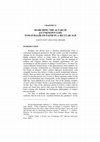
A Czech Perspective on Faith in a Secular Age. Edited by T. Halik, P. Hosek. Washington D.C.: The Council for Research in Values and Philosophy, 2015, 97-126.
Martin Kočí and Pavel Roubík deal with Tomáš Halík’s approach to religiosity in a postmodern cont... more Martin Kočí and Pavel Roubík deal with Tomáš Halík’s approach to religiosity in a postmodern context. They present Halík’s understanding of modern secular culture as a non-institutional “heterodox form of Christian faith”. In the following part, Halík’s philosophical and theological interpretation of the contemporary religious situation (with a special focus on Czech culture) is analyzed and discussed. Part three deals with Halík's reading of the Zacchaeus’ of the current (Czech) religious situation. Following Jesus, the Church should reach out to the Zacchaeuses (i.e. seekers) of today. The last part of chapter six deals with Halík’s particular theological interpretation of atheism. In an extensive conclusion, the authors formulate critical questions and remarks and suggest possible venues for further elaboration on Halík’s original thought.
Review Essays by Martin Koci
Continental Philosophy Review, 2020
The studies of the Czech phenomenologist Jan Patočka (1907–1977) has been flourishing recently.... more The studies of the Czech phenomenologist Jan Patočka (1907–1977) has been flourishing recently. Martin Ritter’s book Into the World: The Movement of Patočka’s Phenomenology (Springer 2019) offers an important contribution to the debate and a long-awaited critical presentation of Patočka’s asubjective phenomenology as well as creative re-reading of Patočka’s central doctrine of the movements of existence.
Louvain Studies, 2020
Justin Sands. Reasoning from Faith: Fundamental Theology in Merold Westphal’s Philosophy of Relig... more Justin Sands. Reasoning from Faith: Fundamental Theology in Merold Westphal’s Philosophy of Religion. Indiana Series in the Philosophy of Religion. Bloomington IN and Indianapolis IN: Indiana University Press, 2018. xii + 298 pp. $35.00. ISBN 978-0-253-03193-8.
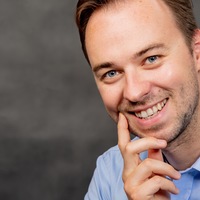
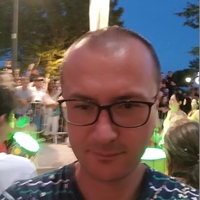
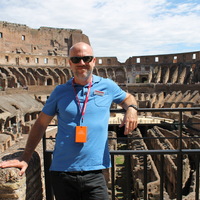



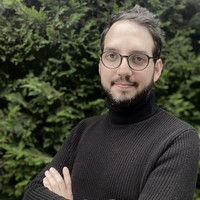

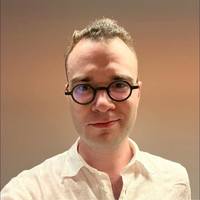
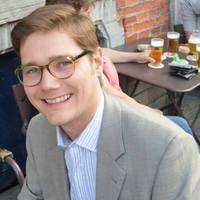

Uploads
Books by Martin Koci
Three distinguished persons, His Holiness the 14th Dalai Lama, the Prague auxiliary bishop and former dissident Václav Malý, and the Polish Dominican Tomasz Dostatni opens the book with the words of wishes addressed to Tomáš Halík. The rest of the book is composed of academic texts.
Alister McGrath analyses Halík’s contribution to the practice of theology in an age of uncertainty. Mcgrath finds the most promising issue in Halík’s method of overcoming lethargy (both spiritual and intellectual). On a similar note, but in a different context, Charles Taylor argues that the only way how to defeat fundamentalism of any kind is the realisation of a dynamic spiritual renewal.
The younger generation of Czech theologians, represented by Denisa Červenková and František Štěch from the Catholic Theological Faculty of Charles University in Prague, engages with the question concerning the essence of theology. Červenková focuses on spirituality as the internal necessity for practising theology, whereas Štěch presents theology as publicly relevant discourse, and thus focuses on its external impact. Both texts highly resonate in the Czech academic debate where the debate on the nature of theology has not yet been sufficiently saturated.
Grace Davie from Exeter and Lieven Boeve from Leuven open a broader perspective. Davie presents the contextual perspective on the position of Christianity in a secular Europe. Boeve, presupposing this contextual perspective, show the paradigm shift of theology which is both unavoidable and necessary for theology to remain contextually relevant but also theologically plausible. The Cambridge theologian Janet M. Soskice then provides us with an example how such an open theology, an approach practised by Tomáš Halík, might look like. Similarly, William Barbieri from the Catholic University of America presents an argument how contextual and historical changes, called ‘signs of the time’ in the tradition of the Second Vatican Council, interacts with the Christian faith and its doctrinal development.
Besides being a scholar, intellectual and academic, Tomáš Halík is also a priest. This fact is reflected in texts which focused on pastoral issues of the contemporary Catholic Church. Paul M. Zuhlener narrates the story of the ‘Pro Pope Francis’ initiative, which he developed in cooperation with Halík. Martin Staněk, a close collaborator of Halík from the Academic Parish of Prague, deals with a difficult matter of pastoral care of divorced and remarried catechumens.
Tereza Matějčková, Pavel Hošek, and Martin Kočí return back to more theoretical questions, in one way or another associated with Halík’s own work. Matějčková treats the question of modern nihilism. Hošek, in dialogue with C. S. Lewis, meditates on the question of evil. Finally, Kočí critically engages with the future of religion in an age of media.
One of the principal domains of Halík’s interest is the interreligious dialogue. The rabbi Karol E. Sidon contributed to this book with an authentic Jewish interpretation of Torah. This remarkable text shows that the world of Judaism is truly complicated and very different from a popular imaginary and perception.
Benedikt T. Mohleník makes a similar argument, although in a completely different context. On the example of the creation of the Dominican order and its historiographic rendering, Mohelník shows that the medieval mentality is much more modern than the popular comprehension of the Middle Ages.
Last two texts leave the space of academic pulpit to come back to the church where Halík acts as a priest. Norbert Schmidt deals with the question of liturgical space. On the examples from the first half of 20th century, Schmidt argues that the space of liturgical celebration and its architectonical rendering is the expression of intellectual engagement with the thought of the time. Ivana Noble concludes this book with a meditation on the identity of pastors and spiritual leaders in our liquid times.
Journal Articles by Martin Koci
For decades now, the end of metaphysics has been heralded. Engaging with the issue at stake, first, I will present and critically discuss Jan Patočka’s prophetic reflection on the fate of metaphysics after (the end of) metaphysical philosophy. This will show that the problem is far more complicated and that attempts devoted to overcoming metaphysics often unjustly reduce it. To be able properly address the complexities of the crisis of metaphysics, I will move beyond Patočka and will introduce the agent, which played a decisive role in the history of metaphysics and its devel- opment, that is, theology. I will point out that Patočka’s reconsideration of metaphysical thinking via the reinterpretation of the Platonic Idea correlates with the category of faith. Thus, I will argue that ‘a providential marriage’ between Athens and Jerusalem should not be divorced and that, despite numerous attempts to prove the contrary, the alliance of theology metaphysical thinking is unavoidable and even beneficial for both parts.
Book Chapters by Martin Koci
Review Essays by Martin Koci
Three distinguished persons, His Holiness the 14th Dalai Lama, the Prague auxiliary bishop and former dissident Václav Malý, and the Polish Dominican Tomasz Dostatni opens the book with the words of wishes addressed to Tomáš Halík. The rest of the book is composed of academic texts.
Alister McGrath analyses Halík’s contribution to the practice of theology in an age of uncertainty. Mcgrath finds the most promising issue in Halík’s method of overcoming lethargy (both spiritual and intellectual). On a similar note, but in a different context, Charles Taylor argues that the only way how to defeat fundamentalism of any kind is the realisation of a dynamic spiritual renewal.
The younger generation of Czech theologians, represented by Denisa Červenková and František Štěch from the Catholic Theological Faculty of Charles University in Prague, engages with the question concerning the essence of theology. Červenková focuses on spirituality as the internal necessity for practising theology, whereas Štěch presents theology as publicly relevant discourse, and thus focuses on its external impact. Both texts highly resonate in the Czech academic debate where the debate on the nature of theology has not yet been sufficiently saturated.
Grace Davie from Exeter and Lieven Boeve from Leuven open a broader perspective. Davie presents the contextual perspective on the position of Christianity in a secular Europe. Boeve, presupposing this contextual perspective, show the paradigm shift of theology which is both unavoidable and necessary for theology to remain contextually relevant but also theologically plausible. The Cambridge theologian Janet M. Soskice then provides us with an example how such an open theology, an approach practised by Tomáš Halík, might look like. Similarly, William Barbieri from the Catholic University of America presents an argument how contextual and historical changes, called ‘signs of the time’ in the tradition of the Second Vatican Council, interacts with the Christian faith and its doctrinal development.
Besides being a scholar, intellectual and academic, Tomáš Halík is also a priest. This fact is reflected in texts which focused on pastoral issues of the contemporary Catholic Church. Paul M. Zuhlener narrates the story of the ‘Pro Pope Francis’ initiative, which he developed in cooperation with Halík. Martin Staněk, a close collaborator of Halík from the Academic Parish of Prague, deals with a difficult matter of pastoral care of divorced and remarried catechumens.
Tereza Matějčková, Pavel Hošek, and Martin Kočí return back to more theoretical questions, in one way or another associated with Halík’s own work. Matějčková treats the question of modern nihilism. Hošek, in dialogue with C. S. Lewis, meditates on the question of evil. Finally, Kočí critically engages with the future of religion in an age of media.
One of the principal domains of Halík’s interest is the interreligious dialogue. The rabbi Karol E. Sidon contributed to this book with an authentic Jewish interpretation of Torah. This remarkable text shows that the world of Judaism is truly complicated and very different from a popular imaginary and perception.
Benedikt T. Mohleník makes a similar argument, although in a completely different context. On the example of the creation of the Dominican order and its historiographic rendering, Mohelník shows that the medieval mentality is much more modern than the popular comprehension of the Middle Ages.
Last two texts leave the space of academic pulpit to come back to the church where Halík acts as a priest. Norbert Schmidt deals with the question of liturgical space. On the examples from the first half of 20th century, Schmidt argues that the space of liturgical celebration and its architectonical rendering is the expression of intellectual engagement with the thought of the time. Ivana Noble concludes this book with a meditation on the identity of pastors and spiritual leaders in our liquid times.
For decades now, the end of metaphysics has been heralded. Engaging with the issue at stake, first, I will present and critically discuss Jan Patočka’s prophetic reflection on the fate of metaphysics after (the end of) metaphysical philosophy. This will show that the problem is far more complicated and that attempts devoted to overcoming metaphysics often unjustly reduce it. To be able properly address the complexities of the crisis of metaphysics, I will move beyond Patočka and will introduce the agent, which played a decisive role in the history of metaphysics and its devel- opment, that is, theology. I will point out that Patočka’s reconsideration of metaphysical thinking via the reinterpretation of the Platonic Idea correlates with the category of faith. Thus, I will argue that ‘a providential marriage’ between Athens and Jerusalem should not be divorced and that, despite numerous attempts to prove the contrary, the alliance of theology metaphysical thinking is unavoidable and even beneficial for both parts.